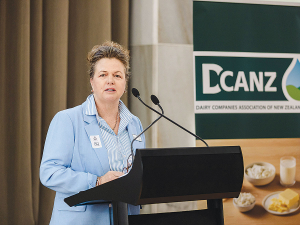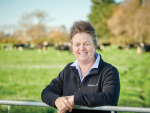DairyNZ chair elect Tracy Brown says working together to create and implement sensible, affordable and enduring policy has never been more important.
The Matamata farmer, who next month becomes chair of the industry-good organisation, says there's finally effort going into non-partisan agreements to support farmers as environmental stewards of the land.
Brown made the comment at a breakfast event in Parliament last week organised by the Dairy Companies Association of New Zealand (DCANZ) and DairyNZ. About 150 people attended, including politicians, industry leaders and farmers.
Brown says many of New Zealand's export markets are sharpening their focus on the country's strong environmental credentials.
"The Government aims to double export value, and emerging technologies are keeping us all on our toes to test, trial and take forward.
"That's why DairyNZ's new strategy takes aim at the long-term success of the dairy sector, including smart partnerships, so we know exactly where we focus, where we can work with others, and how we can make the best collective investments with our partners, to make those big shifts in international competitiveness.
"We are a science-led organisation with farm-systems expertise, and we are driven to serve every dairy farmer of New Zealand.
"We chart a path forward from three strategic pillars: accelerating on-farm productivity, powering more adaptable and resilient farms, and enabling sustainable and competitive dairying.
"Sustainability and profitability must go hand in hand and so our new DairyNZ vision is to make the levy the best investment of every dairy farmer."
Brown noted that DairyNZ was proud to be the industry good organisation for dairy farmers, working hard to ensure close alignment with farmers, research partners, processors, and the Government, to maintain a solid understanding of marketplace challenges and opportunities now and into the future.
"Thankfully, I get the feeling that for the first time in a long time, genuine effort is going into non-partisan agreements to support us as environmental stewards of the land, who deliver on one of the oldest and most noble pursuits there surely ever was - food production."
Brown called for sensible, practical, affordable, enduring policy.
She urged the gathering, when seeking to support the country's wellbeing, look to dairy first.
"When needing to source science-based solutions, look to DairyNZ first.
"When looking for an example of what New Zealand is best at - look to New Zealand dairy farmers first. Because when dairy does well, New Zealand does well."
Brown highlighted dairy's contribution to the country. It is NZ's largest good exporter, delivering around one in every four export dollars.
Milksolid production remains strong and steady, tracking up per cow and per hectare for the last 24 years.
The sector generates almost 55,000 jobs - 38,000 on farm, 16,000 in processing - and is a significant contributor to regional GDP.
The biggest advantage the sector has over others around the world is being pasture-based.
"Pasture first; our unique selling point that keeps us at the top of the international game, with our girls taking 82% of their meals al fresco (open air) in the paddock," she says.
Brown milks 680 cows on 240 hectares in Matamata and has been a DairyNZ director since 2019. She takes over as chair from Jim van der Poel at DairyNZ's annual meeting in Christchurch next month.

















